Psychology Essay: The Impact of Prebiotics on Stress and Brain Health
VerifiedAdded on 2023/06/14
|7
|1461
|139
Essay
AI Summary
This essay discusses the impact of chronic stress on the brain and explores recent research on the potential of prebiotics to reverse stress-induced changes. Drawing from a New York Times article and a primary research paper by Mika et al. (2018), the essay examines how a diet rich in prebiotics and bioactive milk fractions can reduce anxiety-related behavior and modify gene expression in emotion circuits of juvenile rats. The findings suggest that early-life nutrition plays a critical role in brain development, with prebiotics promoting beneficial gut bacteria and neural plasticity. The research highlights the potential of prebiotics to improve sleep patterns, reduce stress, and promote overall gut health, offering a cost-effective and natural approach to combating the negative health outcomes associated with chronic stress. Desklib provides access to similar essays and study resources for students.
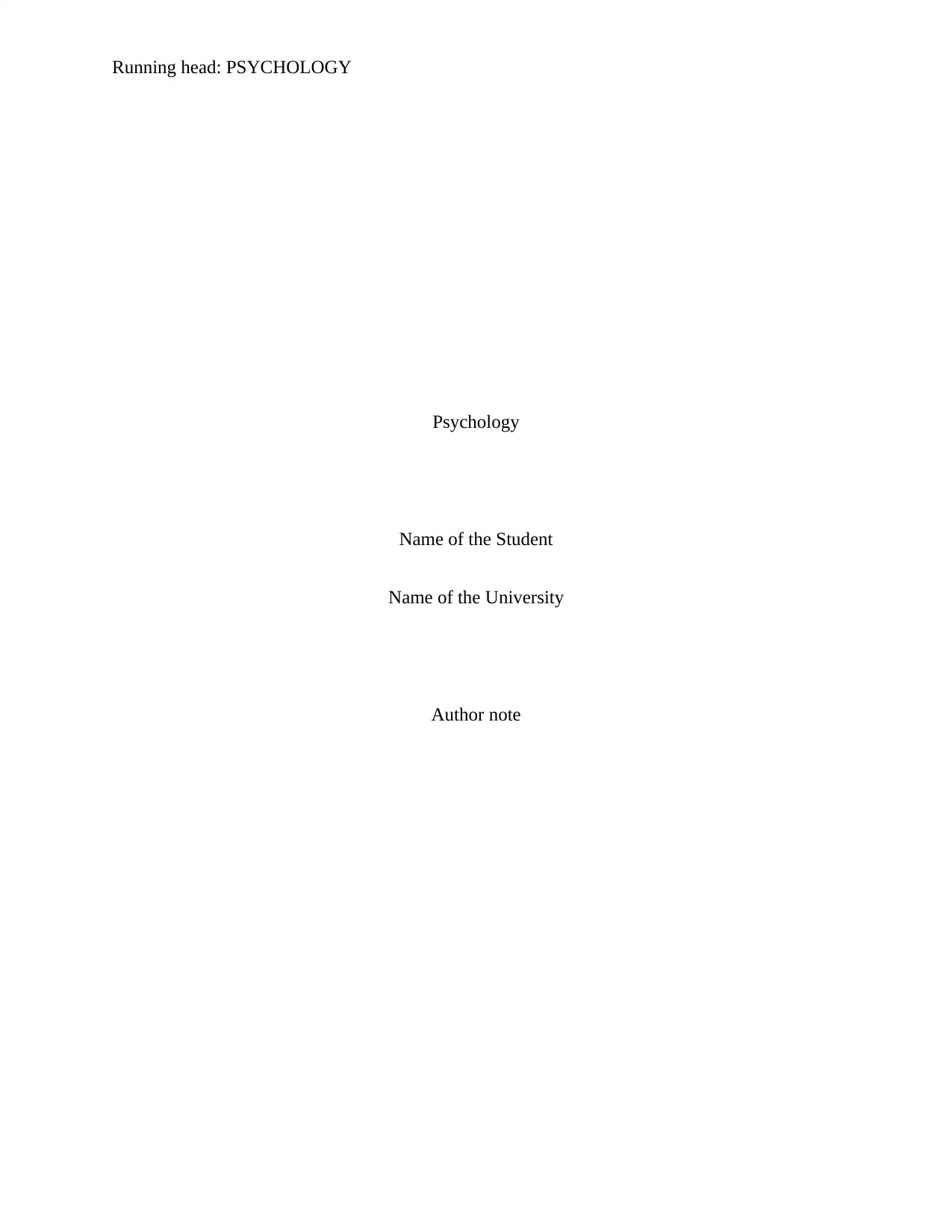
Running head: PSYCHOLOGY
Psychology
Name of the Student
Name of the University
Author note
Psychology
Name of the Student
Name of the University
Author note
Paraphrase This Document
Need a fresh take? Get an instant paraphrase of this document with our AI Paraphraser
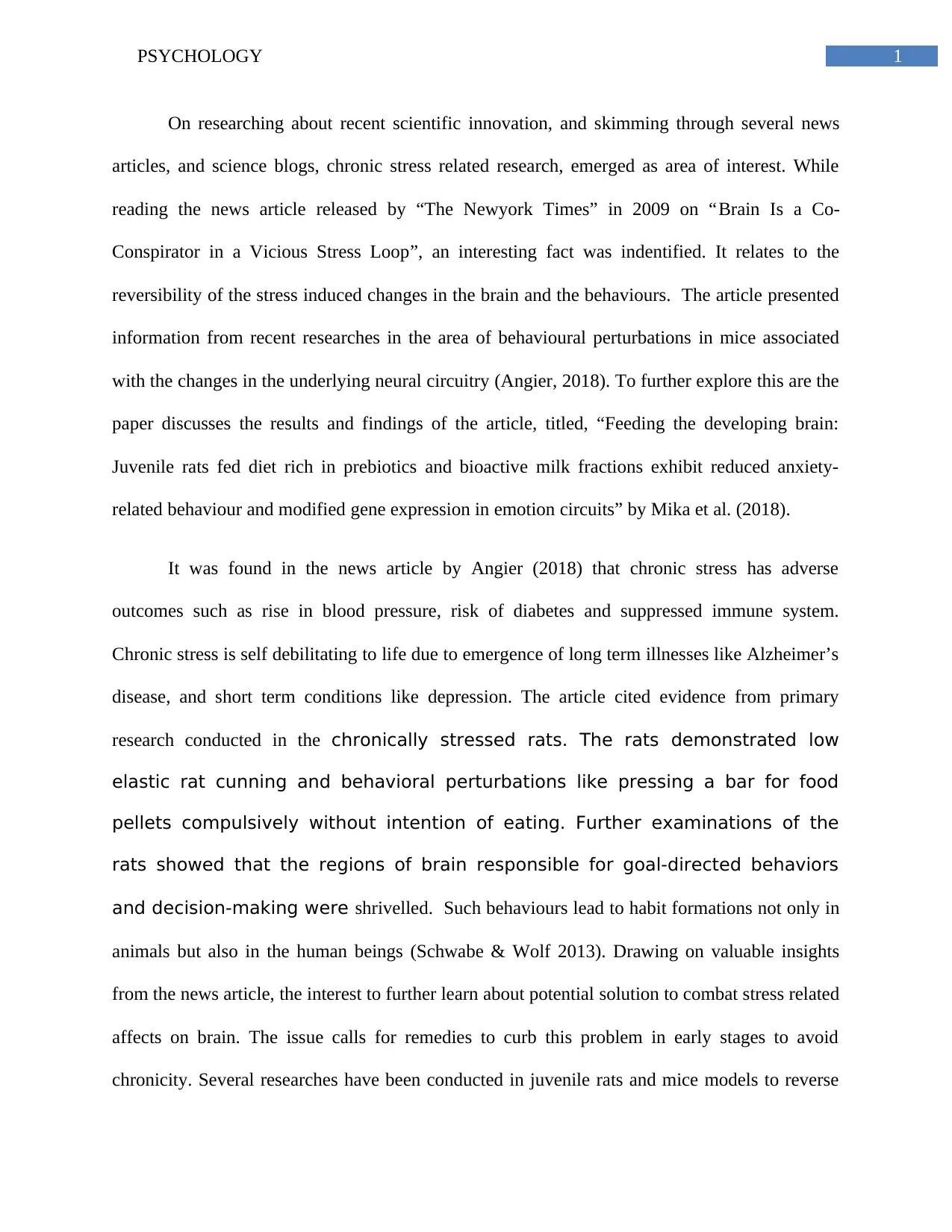
1PSYCHOLOGY
On researching about recent scientific innovation, and skimming through several news
articles, and science blogs, chronic stress related research, emerged as area of interest. While
reading the news article released by “The Newyork Times” in 2009 on “Brain Is a Co-
Conspirator in a Vicious Stress Loop”, an interesting fact was indentified. It relates to the
reversibility of the stress induced changes in the brain and the behaviours. The article presented
information from recent researches in the area of behavioural perturbations in mice associated
with the changes in the underlying neural circuitry (Angier, 2018). To further explore this are the
paper discusses the results and findings of the article, titled, “Feeding the developing brain:
Juvenile rats fed diet rich in prebiotics and bioactive milk fractions exhibit reduced anxiety-
related behaviour and modified gene expression in emotion circuits” by Mika et al. (2018).
It was found in the news article by Angier (2018) that chronic stress has adverse
outcomes such as rise in blood pressure, risk of diabetes and suppressed immune system.
Chronic stress is self debilitating to life due to emergence of long term illnesses like Alzheimer’s
disease, and short term conditions like depression. The article cited evidence from primary
research conducted in the chronically stressed rats. The rats demonstrated low
elastic rat cunning and behavioral perturbations like pressing a bar for food
pellets compulsively without intention of eating. Further examinations of the
rats showed that the regions of brain responsible for goal-directed behaviors
and decision-making were shrivelled. Such behaviours lead to habit formations not only in
animals but also in the human beings (Schwabe & Wolf 2013). Drawing on valuable insights
from the news article, the interest to further learn about potential solution to combat stress related
affects on brain. The issue calls for remedies to curb this problem in early stages to avoid
chronicity. Several researches have been conducted in juvenile rats and mice models to reverse
On researching about recent scientific innovation, and skimming through several news
articles, and science blogs, chronic stress related research, emerged as area of interest. While
reading the news article released by “The Newyork Times” in 2009 on “Brain Is a Co-
Conspirator in a Vicious Stress Loop”, an interesting fact was indentified. It relates to the
reversibility of the stress induced changes in the brain and the behaviours. The article presented
information from recent researches in the area of behavioural perturbations in mice associated
with the changes in the underlying neural circuitry (Angier, 2018). To further explore this are the
paper discusses the results and findings of the article, titled, “Feeding the developing brain:
Juvenile rats fed diet rich in prebiotics and bioactive milk fractions exhibit reduced anxiety-
related behaviour and modified gene expression in emotion circuits” by Mika et al. (2018).
It was found in the news article by Angier (2018) that chronic stress has adverse
outcomes such as rise in blood pressure, risk of diabetes and suppressed immune system.
Chronic stress is self debilitating to life due to emergence of long term illnesses like Alzheimer’s
disease, and short term conditions like depression. The article cited evidence from primary
research conducted in the chronically stressed rats. The rats demonstrated low
elastic rat cunning and behavioral perturbations like pressing a bar for food
pellets compulsively without intention of eating. Further examinations of the
rats showed that the regions of brain responsible for goal-directed behaviors
and decision-making were shrivelled. Such behaviours lead to habit formations not only in
animals but also in the human beings (Schwabe & Wolf 2013). Drawing on valuable insights
from the news article, the interest to further learn about potential solution to combat stress related
affects on brain. The issue calls for remedies to curb this problem in early stages to avoid
chronicity. Several researches have been conducted in juvenile rats and mice models to reverse
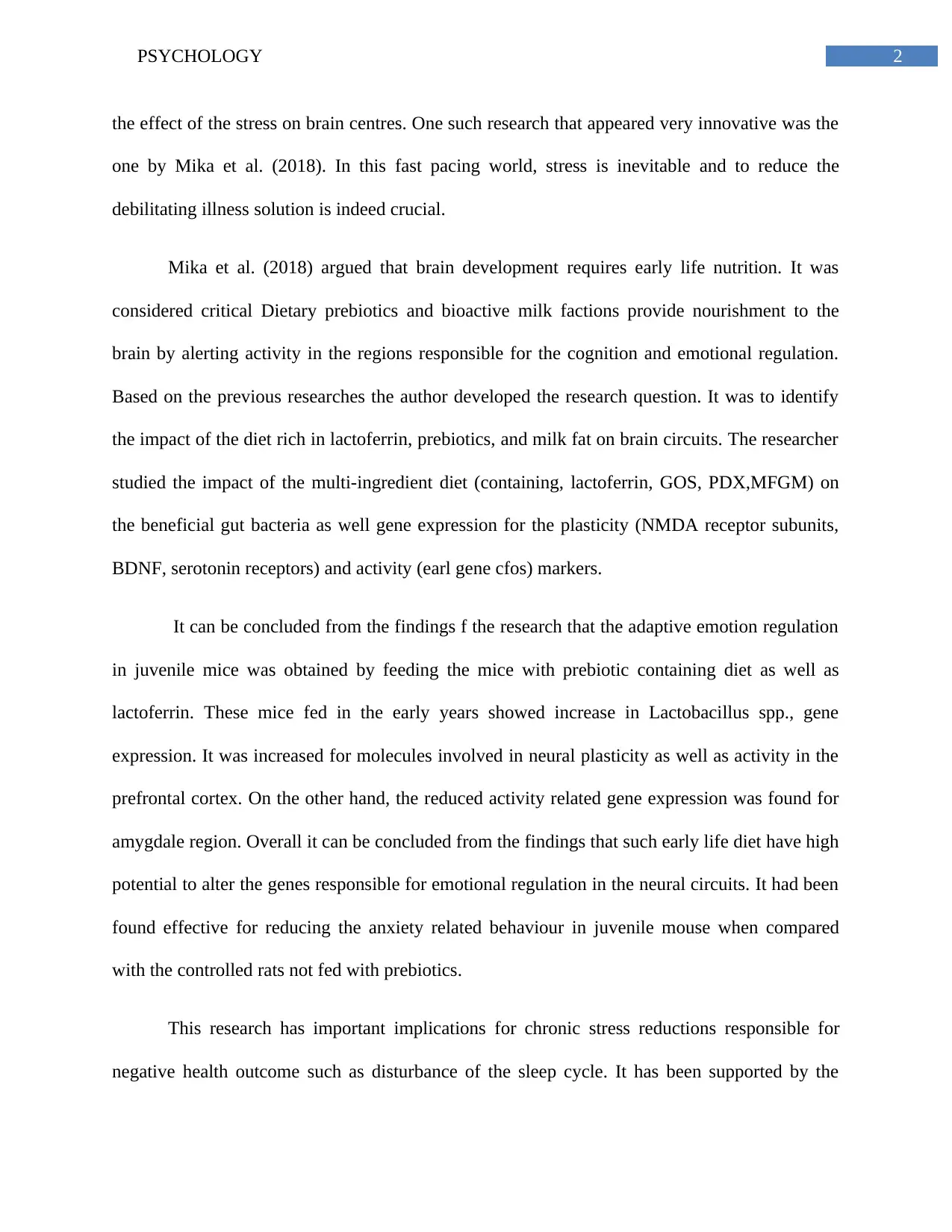
2PSYCHOLOGY
the effect of the stress on brain centres. One such research that appeared very innovative was the
one by Mika et al. (2018). In this fast pacing world, stress is inevitable and to reduce the
debilitating illness solution is indeed crucial.
Mika et al. (2018) argued that brain development requires early life nutrition. It was
considered critical Dietary prebiotics and bioactive milk factions provide nourishment to the
brain by alerting activity in the regions responsible for the cognition and emotional regulation.
Based on the previous researches the author developed the research question. It was to identify
the impact of the diet rich in lactoferrin, prebiotics, and milk fat on brain circuits. The researcher
studied the impact of the multi-ingredient diet (containing, lactoferrin, GOS, PDX,MFGM) on
the beneficial gut bacteria as well gene expression for the plasticity (NMDA receptor subunits,
BDNF, serotonin receptors) and activity (earl gene cfos) markers.
It can be concluded from the findings f the research that the adaptive emotion regulation
in juvenile mice was obtained by feeding the mice with prebiotic containing diet as well as
lactoferrin. These mice fed in the early years showed increase in Lactobacillus spp., gene
expression. It was increased for molecules involved in neural plasticity as well as activity in the
prefrontal cortex. On the other hand, the reduced activity related gene expression was found for
amygdale region. Overall it can be concluded from the findings that such early life diet have high
potential to alter the genes responsible for emotional regulation in the neural circuits. It had been
found effective for reducing the anxiety related behaviour in juvenile mouse when compared
with the controlled rats not fed with prebiotics.
This research has important implications for chronic stress reductions responsible for
negative health outcome such as disturbance of the sleep cycle. It has been supported by the
the effect of the stress on brain centres. One such research that appeared very innovative was the
one by Mika et al. (2018). In this fast pacing world, stress is inevitable and to reduce the
debilitating illness solution is indeed crucial.
Mika et al. (2018) argued that brain development requires early life nutrition. It was
considered critical Dietary prebiotics and bioactive milk factions provide nourishment to the
brain by alerting activity in the regions responsible for the cognition and emotional regulation.
Based on the previous researches the author developed the research question. It was to identify
the impact of the diet rich in lactoferrin, prebiotics, and milk fat on brain circuits. The researcher
studied the impact of the multi-ingredient diet (containing, lactoferrin, GOS, PDX,MFGM) on
the beneficial gut bacteria as well gene expression for the plasticity (NMDA receptor subunits,
BDNF, serotonin receptors) and activity (earl gene cfos) markers.
It can be concluded from the findings f the research that the adaptive emotion regulation
in juvenile mice was obtained by feeding the mice with prebiotic containing diet as well as
lactoferrin. These mice fed in the early years showed increase in Lactobacillus spp., gene
expression. It was increased for molecules involved in neural plasticity as well as activity in the
prefrontal cortex. On the other hand, the reduced activity related gene expression was found for
amygdale region. Overall it can be concluded from the findings that such early life diet have high
potential to alter the genes responsible for emotional regulation in the neural circuits. It had been
found effective for reducing the anxiety related behaviour in juvenile mouse when compared
with the controlled rats not fed with prebiotics.
This research has important implications for chronic stress reductions responsible for
negative health outcome such as disturbance of the sleep cycle. It has been supported by the
⊘ This is a preview!⊘
Do you want full access?
Subscribe today to unlock all pages.

Trusted by 1+ million students worldwide
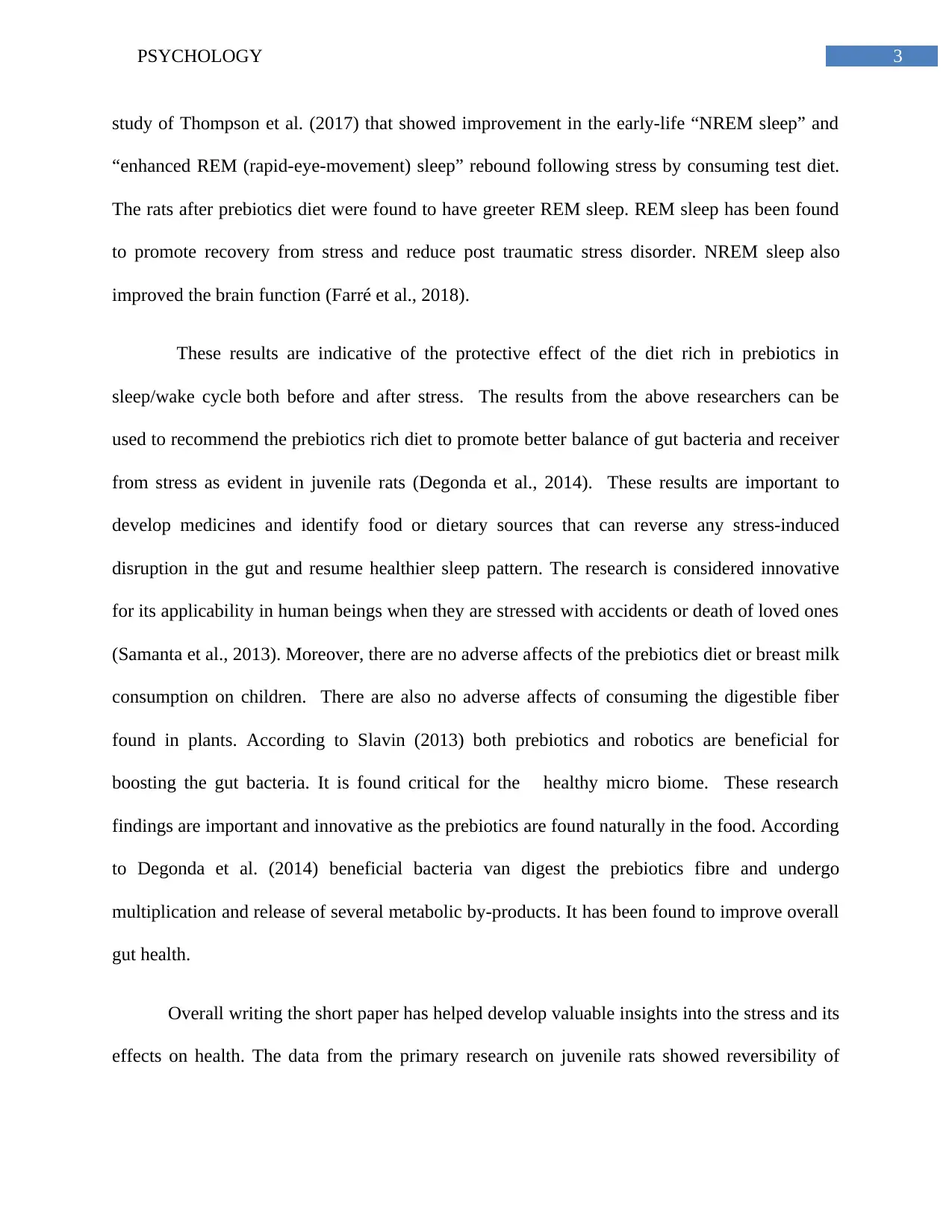
3PSYCHOLOGY
study of Thompson et al. (2017) that showed improvement in the early-life “NREM sleep” and
“enhanced REM (rapid-eye-movement) sleep” rebound following stress by consuming test diet.
The rats after prebiotics diet were found to have greeter REM sleep. REM sleep has been found
to promote recovery from stress and reduce post traumatic stress disorder. NREM sleep also
improved the brain function (Farré et al., 2018).
These results are indicative of the protective effect of the diet rich in prebiotics in
sleep/wake cycle both before and after stress. The results from the above researchers can be
used to recommend the prebiotics rich diet to promote better balance of gut bacteria and receiver
from stress as evident in juvenile rats (Degonda et al., 2014). These results are important to
develop medicines and identify food or dietary sources that can reverse any stress-induced
disruption in the gut and resume healthier sleep pattern. The research is considered innovative
for its applicability in human beings when they are stressed with accidents or death of loved ones
(Samanta et al., 2013). Moreover, there are no adverse affects of the prebiotics diet or breast milk
consumption on children. There are also no adverse affects of consuming the digestible fiber
found in plants. According to Slavin (2013) both prebiotics and robotics are beneficial for
boosting the gut bacteria. It is found critical for the healthy micro biome. These research
findings are important and innovative as the prebiotics are found naturally in the food. According
to Degonda et al. (2014) beneficial bacteria van digest the prebiotics fibre and undergo
multiplication and release of several metabolic by-products. It has been found to improve overall
gut health.
Overall writing the short paper has helped develop valuable insights into the stress and its
effects on health. The data from the primary research on juvenile rats showed reversibility of
study of Thompson et al. (2017) that showed improvement in the early-life “NREM sleep” and
“enhanced REM (rapid-eye-movement) sleep” rebound following stress by consuming test diet.
The rats after prebiotics diet were found to have greeter REM sleep. REM sleep has been found
to promote recovery from stress and reduce post traumatic stress disorder. NREM sleep also
improved the brain function (Farré et al., 2018).
These results are indicative of the protective effect of the diet rich in prebiotics in
sleep/wake cycle both before and after stress. The results from the above researchers can be
used to recommend the prebiotics rich diet to promote better balance of gut bacteria and receiver
from stress as evident in juvenile rats (Degonda et al., 2014). These results are important to
develop medicines and identify food or dietary sources that can reverse any stress-induced
disruption in the gut and resume healthier sleep pattern. The research is considered innovative
for its applicability in human beings when they are stressed with accidents or death of loved ones
(Samanta et al., 2013). Moreover, there are no adverse affects of the prebiotics diet or breast milk
consumption on children. There are also no adverse affects of consuming the digestible fiber
found in plants. According to Slavin (2013) both prebiotics and robotics are beneficial for
boosting the gut bacteria. It is found critical for the healthy micro biome. These research
findings are important and innovative as the prebiotics are found naturally in the food. According
to Degonda et al. (2014) beneficial bacteria van digest the prebiotics fibre and undergo
multiplication and release of several metabolic by-products. It has been found to improve overall
gut health.
Overall writing the short paper has helped develop valuable insights into the stress and its
effects on health. The data from the primary research on juvenile rats showed reversibility of
Paraphrase This Document
Need a fresh take? Get an instant paraphrase of this document with our AI Paraphraser
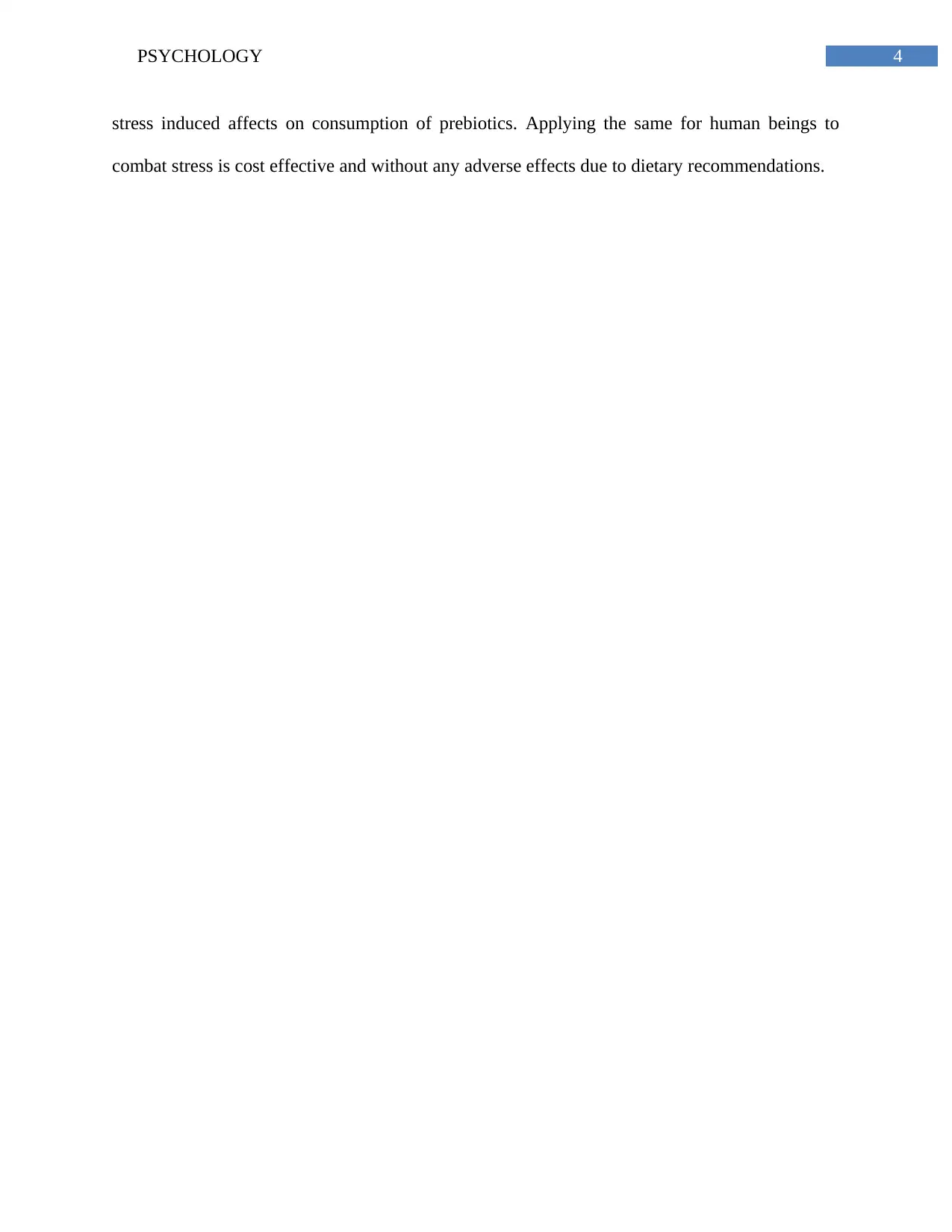
4PSYCHOLOGY
stress induced affects on consumption of prebiotics. Applying the same for human beings to
combat stress is cost effective and without any adverse effects due to dietary recommendations.
stress induced affects on consumption of prebiotics. Applying the same for human beings to
combat stress is cost effective and without any adverse effects due to dietary recommendations.
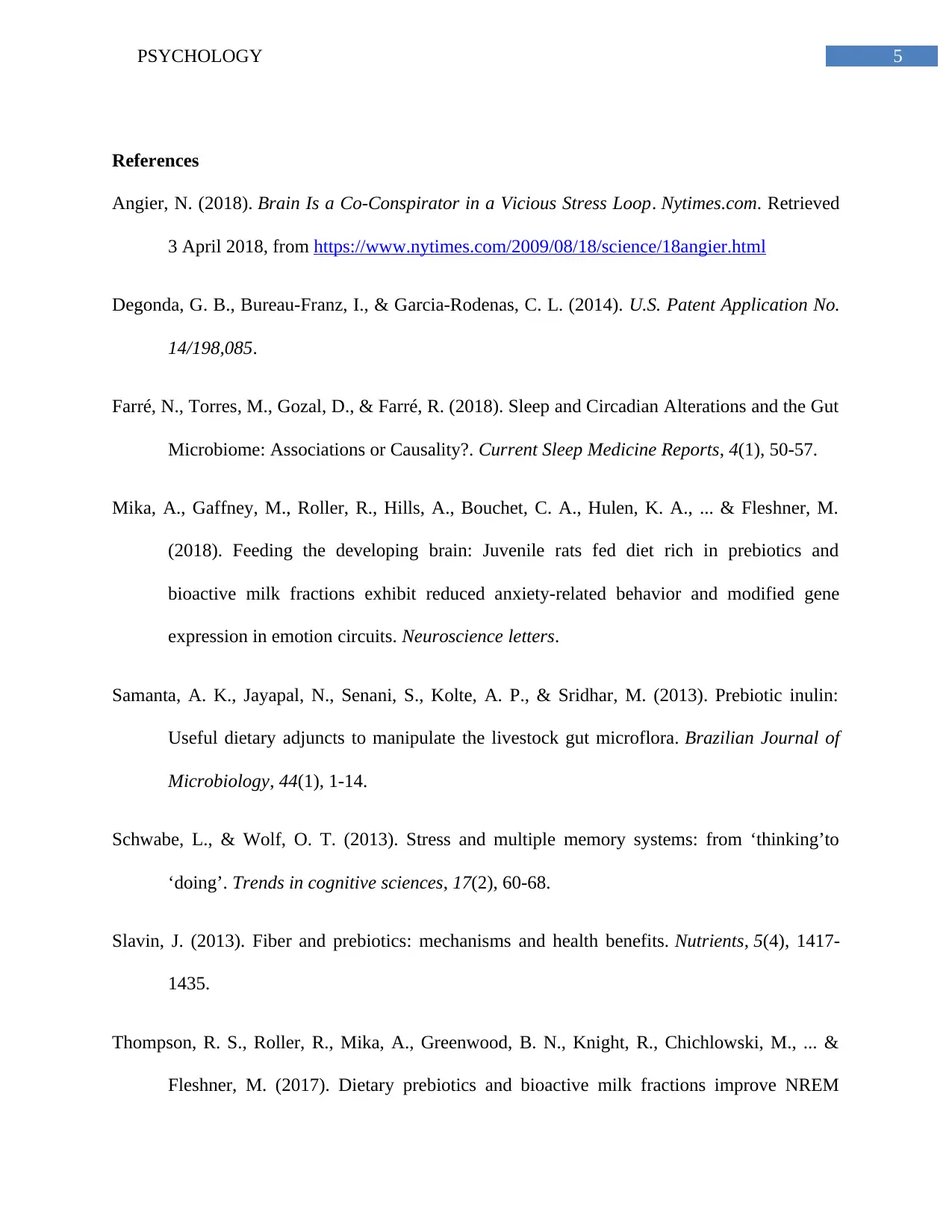
5PSYCHOLOGY
References
Angier, N. (2018). Brain Is a Co-Conspirator in a Vicious Stress Loop. Nytimes.com. Retrieved
3 April 2018, from https://www.nytimes.com/2009/08/18/science/18angier.html
Degonda, G. B., Bureau-Franz, I., & Garcia-Rodenas, C. L. (2014). U.S. Patent Application No.
14/198,085.
Farré, N., Torres, M., Gozal, D., & Farré, R. (2018). Sleep and Circadian Alterations and the Gut
Microbiome: Associations or Causality?. Current Sleep Medicine Reports, 4(1), 50-57.
Mika, A., Gaffney, M., Roller, R., Hills, A., Bouchet, C. A., Hulen, K. A., ... & Fleshner, M.
(2018). Feeding the developing brain: Juvenile rats fed diet rich in prebiotics and
bioactive milk fractions exhibit reduced anxiety-related behavior and modified gene
expression in emotion circuits. Neuroscience letters.
Samanta, A. K., Jayapal, N., Senani, S., Kolte, A. P., & Sridhar, M. (2013). Prebiotic inulin:
Useful dietary adjuncts to manipulate the livestock gut microflora. Brazilian Journal of
Microbiology, 44(1), 1-14.
Schwabe, L., & Wolf, O. T. (2013). Stress and multiple memory systems: from ‘thinking’to
‘doing’. Trends in cognitive sciences, 17(2), 60-68.
Slavin, J. (2013). Fiber and prebiotics: mechanisms and health benefits. Nutrients, 5(4), 1417-
1435.
Thompson, R. S., Roller, R., Mika, A., Greenwood, B. N., Knight, R., Chichlowski, M., ... &
Fleshner, M. (2017). Dietary prebiotics and bioactive milk fractions improve NREM
References
Angier, N. (2018). Brain Is a Co-Conspirator in a Vicious Stress Loop. Nytimes.com. Retrieved
3 April 2018, from https://www.nytimes.com/2009/08/18/science/18angier.html
Degonda, G. B., Bureau-Franz, I., & Garcia-Rodenas, C. L. (2014). U.S. Patent Application No.
14/198,085.
Farré, N., Torres, M., Gozal, D., & Farré, R. (2018). Sleep and Circadian Alterations and the Gut
Microbiome: Associations or Causality?. Current Sleep Medicine Reports, 4(1), 50-57.
Mika, A., Gaffney, M., Roller, R., Hills, A., Bouchet, C. A., Hulen, K. A., ... & Fleshner, M.
(2018). Feeding the developing brain: Juvenile rats fed diet rich in prebiotics and
bioactive milk fractions exhibit reduced anxiety-related behavior and modified gene
expression in emotion circuits. Neuroscience letters.
Samanta, A. K., Jayapal, N., Senani, S., Kolte, A. P., & Sridhar, M. (2013). Prebiotic inulin:
Useful dietary adjuncts to manipulate the livestock gut microflora. Brazilian Journal of
Microbiology, 44(1), 1-14.
Schwabe, L., & Wolf, O. T. (2013). Stress and multiple memory systems: from ‘thinking’to
‘doing’. Trends in cognitive sciences, 17(2), 60-68.
Slavin, J. (2013). Fiber and prebiotics: mechanisms and health benefits. Nutrients, 5(4), 1417-
1435.
Thompson, R. S., Roller, R., Mika, A., Greenwood, B. N., Knight, R., Chichlowski, M., ... &
Fleshner, M. (2017). Dietary prebiotics and bioactive milk fractions improve NREM
⊘ This is a preview!⊘
Do you want full access?
Subscribe today to unlock all pages.

Trusted by 1+ million students worldwide
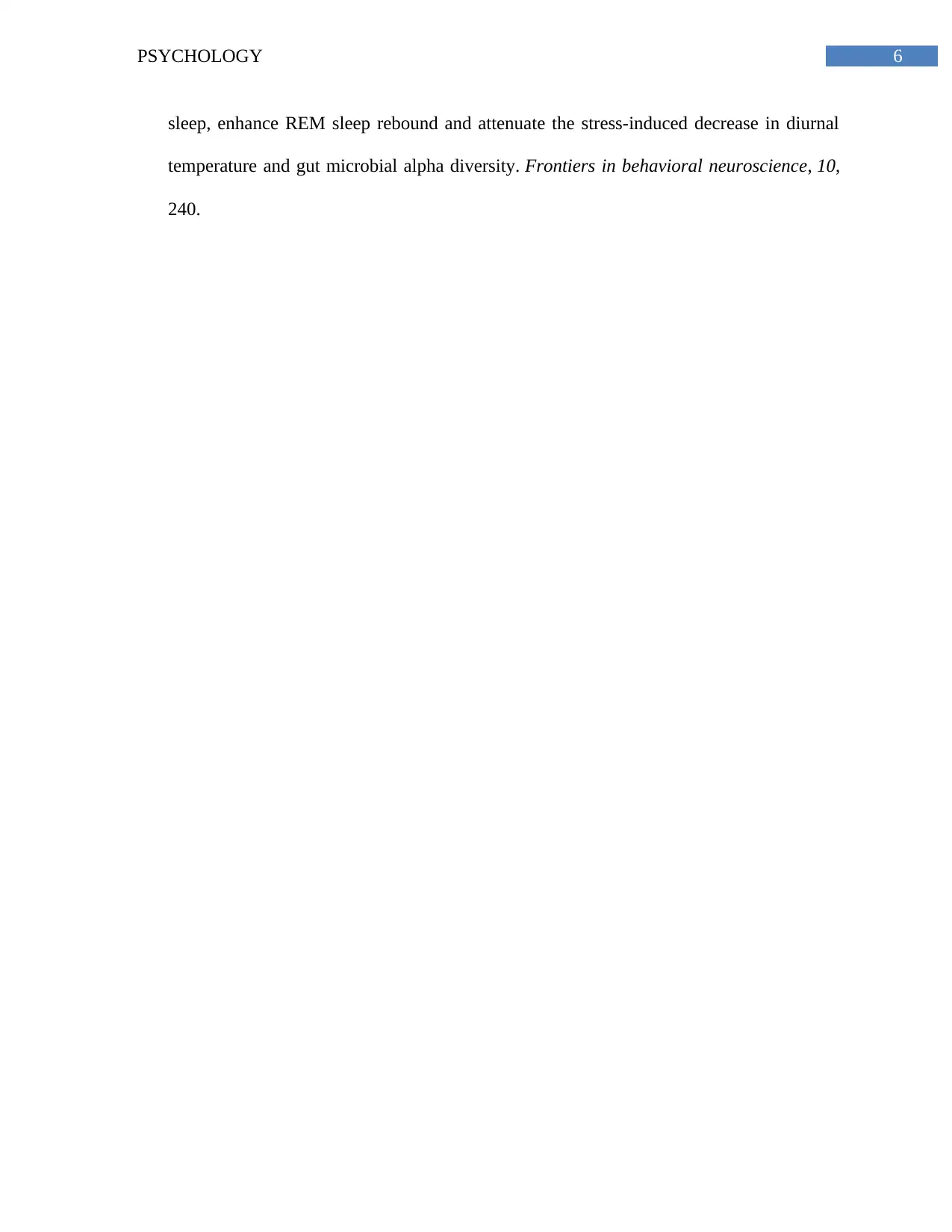
6PSYCHOLOGY
sleep, enhance REM sleep rebound and attenuate the stress-induced decrease in diurnal
temperature and gut microbial alpha diversity. Frontiers in behavioral neuroscience, 10,
240.
sleep, enhance REM sleep rebound and attenuate the stress-induced decrease in diurnal
temperature and gut microbial alpha diversity. Frontiers in behavioral neuroscience, 10,
240.
1 out of 7
Your All-in-One AI-Powered Toolkit for Academic Success.
+13062052269
info@desklib.com
Available 24*7 on WhatsApp / Email
![[object Object]](/_next/static/media/star-bottom.7253800d.svg)
Unlock your academic potential
Copyright © 2020–2026 A2Z Services. All Rights Reserved. Developed and managed by ZUCOL.